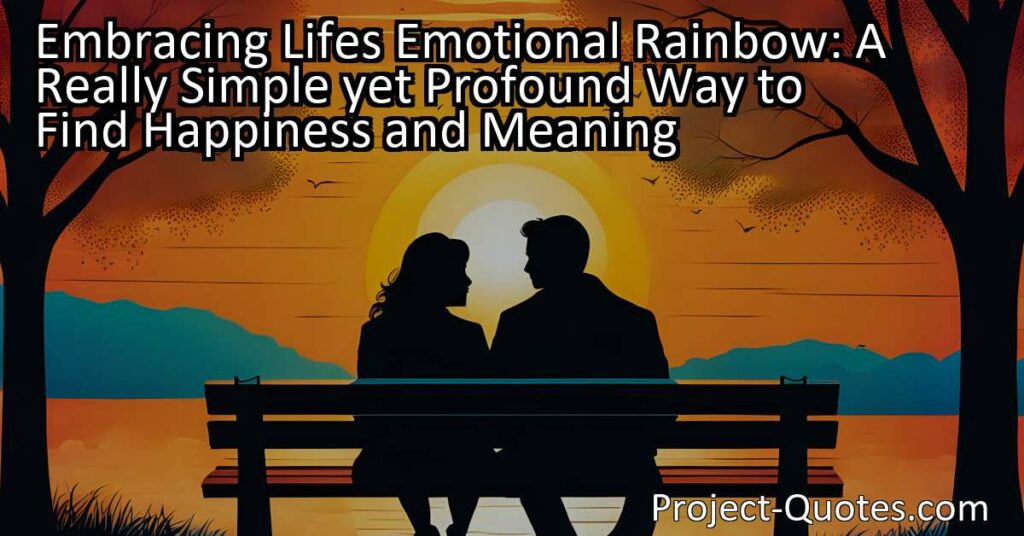Those who don’t know how to weep with their whole heart, don’t know how to laugh either.
Golda Meir
In “Embracing Life’s Emotional Rainbow: Laughing and Weeping with Golda Meir,” you’ll learn about a simple yet profound way to find happiness and meaning. Golda Meir, the former Prime Minister of Israel, believed that fully experiencing both sadness and joy is the key to a fulfilling life. By embracing all of our emotions and allowing ourselves to laugh and cry, we can connect with others and create a more vibrant world.
Table of Contents
- 1 Those who don’t know how to weep with their whole heart, don’t know how to laugh either.
- 2 Golda Meir
- 3 Meaning of Quote – Those who don’t know how to weep with their whole heart, don’t know how to laugh either.
- 4 Embracing Life’s Emotional Rainbow: Laughing and Weeping with Golda Meir
- 5 Freely Shareable Quote Image
- 6 Related
Meaning of Quote – Those who don’t know how to weep with their whole heart, don’t know how to laugh either.
Embracing Life’s Emotional Rainbow: Laughing and Weeping with Golda Meir
Golda Meir, a notable figure in history who was once the Prime Minister of Israel, shared a thought that touches the soul in a really simple yet profound way. She said, “Those who don’t know how to weep with their whole heart, don’t know how to laugh either.” Pause for a second and let that sink in. What do you think she meant by that?
Let’s unpack it like we’re detectives solving a mystery, bit by bit. Imagine life as a big, beautiful book. Every page has a different picture on itsome are splashed with the brightest colors, with people smiling and laughing under a sunny sky. Other pages are darker, with grayer shades and pictures of people who might be sad or alone.
Now, Golda Meirs words are like saying that to truly understand and enjoy the bright, colorful pages, you also need to understand and feel those darker, sadder pages. Its like shes sharing a secret with us that knowing how to feel sad and really let it out gives us a superpower to feel incredible happiness. How can that be?
Well, feeling emotions is part of what makes us human. So, imagine a day where youre outside, and suddenly, it starts to rain. Instead of running for cover, you just stand there and let the rain fall, soaking you to the bone. Its cold and a little uncomfortable at first, but then, something magical happens. You start to notice how the raindrops make little drumbeats on the ground, how the air smells fresh, and how the trees seem to dance in the drizzle. By letting yourself experience the rain instead of hiding from it, you see the beauty in the storm.
Its the same with our feelings. When something sad happensa pet gets sick, or a friend moves awayif you let yourself really feel the sadness, crying if you need to, its like letting the rain wash over you. Its not much fun while it’s happening, but once its passed, you might notice that you feel a bit lighter, just like how the world feels cleaner right after it rains.
On the flip side, let’s chat about laughing. You know when something is so funny you just start laughing uncontrollably? Maybe youre chuckling at a joke, or giggling because someone made a funny face. But its not a simple smile; its a laugh that shakes your whole body, making you gasp for breath, tears streaming down your face. That laughwow, its a good feeling.
Golda was on to something when she said that if you dont know how to weep with your whole heart, you can’t fully understand what it means to have one of those big, deep belly laughs. She suggested that the depth of our sadness is related to the heights of our joy. They’re two sides of the same coin.
Think about a movie or a book that’s made you feel all the feels. Maybe the characters go through some tough times, and it gets so intense that you’re right there with them, feeling their pain and maybe even shedding a tear (or two). But then, when things turn around, and there’s a happy ending, isn’t the joy so much sweeter because of the struggles the characters went through? That joy sticks with youheck, you might be talking about that story for days because it really moved you.
That’s why letting ourselves truly feel sadness, not holding it back, is important. It’s not just about being sad, thoughnobody wants to be down in the dumps all the time. It’s about feeling all our feelings honestly and completely, trusting that it’s okay to be sad sometimes because it helps us appreciate the happy times even more.
Take a look around you; the world is bursting with emotions. Friends sharing secrets and laughing together, families hugging after being apart, someone quietly reflecting on a tough day. Every emotion tells a story, and when you learn to embrace both the highs and the lows, youre getting to know the full story of what it means to be alive.
You see, Golda Meir wasnt just talking about feelings; she was talking about empathy. Thats the super cool ability to understand and share the feelings of others. When weve felt something deeply ourselves, we get better at seeing it in others and being there for them. Like, say your buddy’s down because they did badly on a test. If you’ve ever felt disappointed, you’d get where theyre coming from. You can be the person who listens, who helps them smile again, and that’s pretty amazing.
So, whats the takeaway from all of this? Embrace every feeling. Don’t shy away from the sad moments; they have a lot to teach us. And when those joyful moments swing by, like a surprise party or a messy ice cream sundae on a hot day, don’t be afraid to laugh loud and proud.
Golda Meir handed us a key to living a colorful, full life: feel deeply, cry when needed, and let your laughter echo. By doing so, we not only get to truly know ourselves and this incredible life were all sharing, but we also connect with the people around us in a more meaningful way. Emotions are our rainbowevery shade is essential to see its full beauty. Now go ahead, feel them all and watch how bright your world can become.
I hope this quote inspired image brings you hope and peace. Share it with someone who needs it today!


